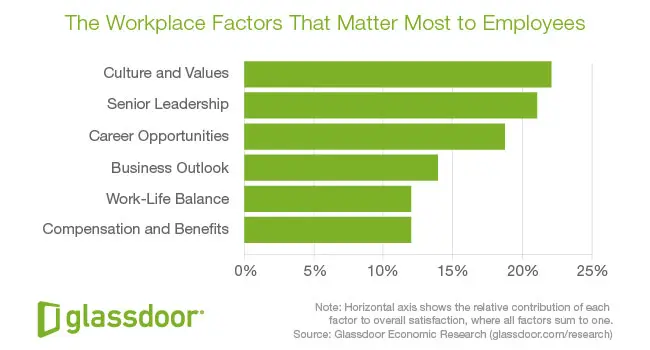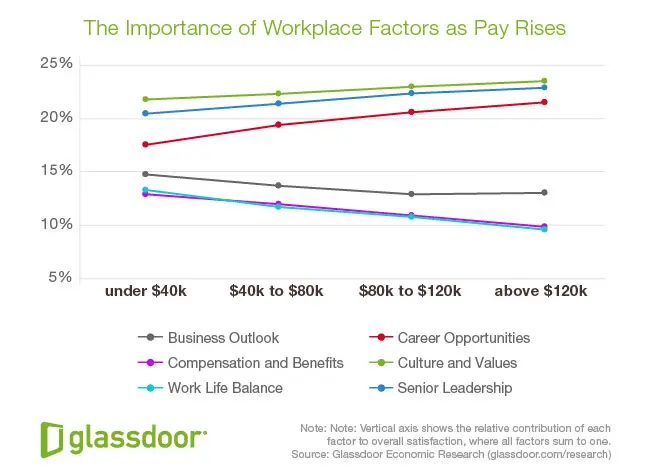Does more money change what we value at work?
It’s a question both researchers and workplace managers have puzzled over for a long while. An oft-cited study from Princeton suggested that it does factor into having less stress and more overall satisfaction, but only to a point. The threshold wasn’t a magical six-figure salary, but rather plateaued at around $75,000 per year. Yet when the CEO of Gravity Payments attempted to buy the happiness of his employees by paying them all a salary of $70,000, the results were mixed.
Glassdoor’s data scientist Patrick Wong points to previous Glassdoor research that revealed there was somewhat of a correlation. Analyzing the reviews of 221,000 users who posted their salaries and a review of their employer found that just 10% of them who made over $120,000 per year gave their company a one-star rating. Fifteen percent of those who made less than $30,000 per year gave a one-star rating. Though it’s a small margin, it seems to indicate that lower salaries correlate to lower job satisfaction. That analysis also surfaced some other elements that make workers feel more engaged, including opportunities for advancement, an employer’s culture and values, and the quality of its senior leadership.
This prompted the current question, says Wong: Do the job factors you care about most change as your income changes? As pay rises, do our workplace priorities around compensation, work-life balance, and career opportunities shift as well?
To find the answers, Glassdoor mined the data from more than 615,000 Glassdoor users who, like in the previous study, reported their salaries and a review of their employer since 2014. These users were grouped by income and ranked the following:
- Career opportunities
- Compensation and benefits
- Culture and values
- Senior leadership
- Work-life balance
- Business outlook
Wong says these factors were ranked in order of importance to the employee and placed in a corresponding graph. Perhaps most surprising was that compensation and benefits came in last overall at 12%. The most important factor for job satisfaction was the company’s culture and values at 22%.

This changed based on how much people earned. “We see a clear pattern, with some workplace factors becoming more important as pay rises, and others becoming less important to overall employee satisfaction,” Wong writes. Less than 10% of those making more than $120,000 per year said that compensation and benefits was integral to their satisfaction. But surprisingly, only 12.8% of those making less than $40,000 said that the amount of their check gave them job satisfaction.
The factors that were less important to the high earners were work-life balance and the company’s business outlook over the next six months. Wong attributes this to the fact that the bigger the check, the more likely they were to spend more time at work.
Finally, interest in how well the company is doing also falls as the paycheck increases. Wong speculates that this could be due to the fact that “lower-income workers are more concerned about economic insecurity, or that higher-income workers are mostly employed in larger, more stable companies.”
What matters to all workers, but particularly the highest earners, are culture and values, which ties into senior leadership (as they are often in charge of both). “As pay rises, employees shift priorities toward long-term careers, working under great leaders, and spending their days in a workplace with positive culture and values,” says Wong.

We’ve seen this play out across numerous reports that rank the best places to work and the top CEOs. In a previous interview with Fast Company, Jennifer Aaker, a professor of marketing at Stanford Graduate School of Business, said, “New research shows there is a strong correlation between happiness and meaning—in fact, having a meaningful impact on the world around you is actually a better predictor of happiness than many other things you think will make you happy.”
CareerBliss found that the consistent themes among the 50 companies that made their 2016 list included career development support and a positive relationship with managers, both evidence of a strong company culture. Heidi Golledge, cofounder of CareerBliss, told Fast Company in a previous interview, “Employees once again stated that compensation is important, but far beyond a paycheck is the relationship they have with their coworkers and manager that defines a happy workplace for them.”
According to a Dale Carnegie Training survey of 3,300 workers, almost 40% are ready to jump ship because of poor management. That report found that honest and trustworthy leaders make workers feel nearly 10 times more satisfied with their job. Those whose management aren’t perceived as such are four times more likely to be looking for a different job.
All this adds up to the fact that money in the form of a handsome paycheck can buy some degree of happiness. But the culture of your workplace and its leaders factor in much more for your personal bottom line.
Recognize your company's culture of innovation by applying to this year's Best Workplaces for Innovators Awards before the extended deadline, April 12.
